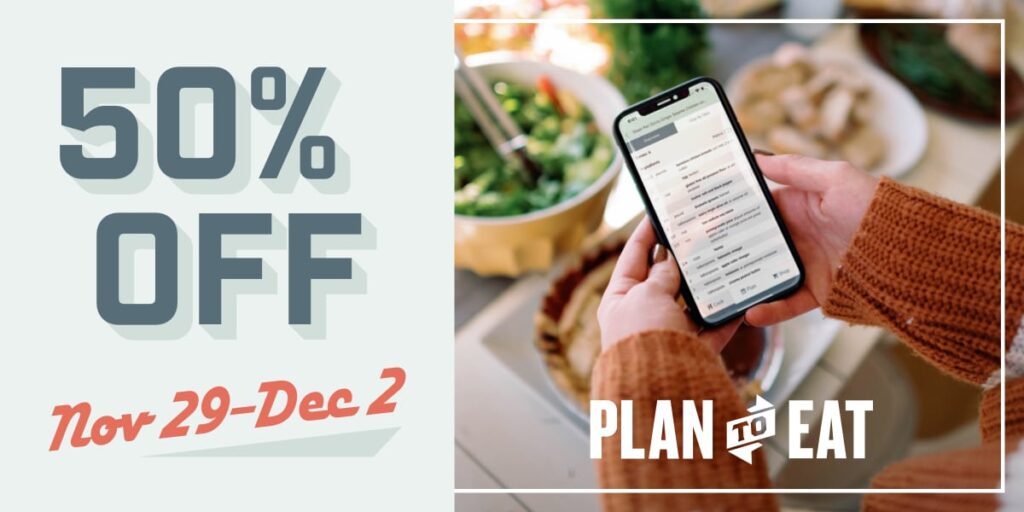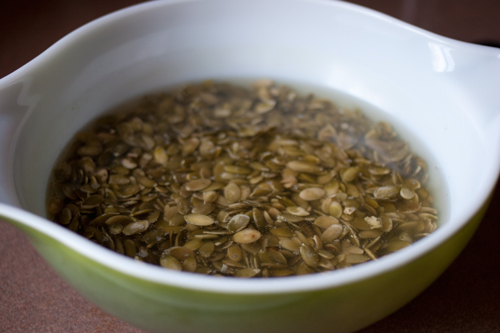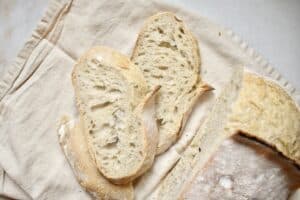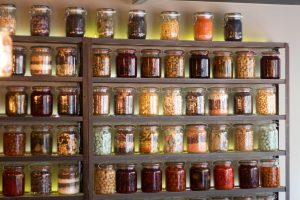
Dinner Table Rating ![]()
![]()
![]()
![]()
![]()
![]()
1 thumb per family member
Cook’s Rating
Accessibility of ingredients, ease of preparation, and affordability
This recipe (and next week’s) began as a history project for the Sweet Pea, who had studied the Native Americans the week before. I suggested that we find some Ancient Native American recipes to try out and she was really excited about this idea. I expected her to pick out something with berries, or cornbread. But my adventurous little historian chose Pepitas and another truly native food, Pemmican. This week I’m posting the Pepitas and next week we’ll talk Pemmican.
Sally notes that nuts and seeds, when raw, contain numerous enzyme inhibitors. Now, about the only thing I remember from my 10th grade biology class is when my friend Jacob stuck a penny in a light-socket, which proved the Theory of Conductivity (and I’m not even sure that that’s biology–would that be physics?) but didn’t do much for my biological education. But I’ve done some research (thanks, Google) and the way I understand it is this: An enzyme inhibitor is a molecule that binds to an enzyme and prevents it from functioning in the normal manner. The digestion of your food is dependent upon digestive enzymes in your gut. So, if you eat an enzyme inhibitor and it binds to your digestive enzymes, then your food will not be digested properly and you will find yourself in some amount of discomfort.
However, seeds and nuts are easier to digest and their nutrients more readily available, if they are first soaked in salt water and then dried slowly in a warm oven. This is, essentially, mimicking the process that seeds and nuts get in nature: rain and sun. The enzyme inhibitors exist to protect the seed until the ideal circumstances for growth (rain and sun) are met. Once these conditions are met, the enzyme inhibitors are removed and the nutrients needed for germination and growth are activated. So by soaking (rain) and drying (sun) you are not only removing the toxic substance (enzyme inhibitors), but you’re also increasing the availability of the vital nutrients in the seeds. Figuring out this connection made me want to slap my knee and say, “Well, who’da thunk it??” It’s so clever. And the ancient Americans had this figured out centuries ago.
Pepitas (Nourishing Traditions, page 513)
Ingredients
- 4 cups raw, hulled pumpkin seeds
- 2 tablespoons sea salt
- 1 teaspoon cayenne pepper (optional)
- filtered water
1. Dissolve salt in water and add pumpkin seeds and optional cayenne. Leave in a warm place for at least 7 hours or overnight.
I buy all of my seeds and nuts at my local health food store’s bulk department. They are fresher and cheaper than buying them in a standard grocery store. Plus it can be hard to find raw seeds and nuts in the supermarket.
2. Drain in a colander and spread on a stainless steel baking pan. Place in a warm oven (no more than 150 degrees) for about 12 hours or overnight, stirring occasionally, until thoroughly dry and crisp. Store in an airtight container.
The lowest temperature on my oven is 170 degrees. I’ve tried to find any explanation of why the temperature has to be 150. The only thing I can find is a fear of scorching the seeds, which has not been a problem in the least for me. If anyone knows anything different, do share!
These seeds have been the snack of choice (mixed with raisins) for the past few days for the kiddos. Everyone gave them a thumbs up except for the Peanut who will have to grow a few more teeth before enjoying her share.
Pepitas
This recipe imitates the Aztec practice of soaking seeds in brine, then letting them dry in the hot sun.
Source: Nourishing Traditions by Sally Fallon
Course: Treats (Misc.)
Serves:
Ingredients
- 4 cups raw hulled pumpkin seeds
- 2 tablespoons sea salt
- 1 teaspoon cayenne pepper (optional)
- water
Directions
- Directions on page 513 in Nourishing Traditions.








